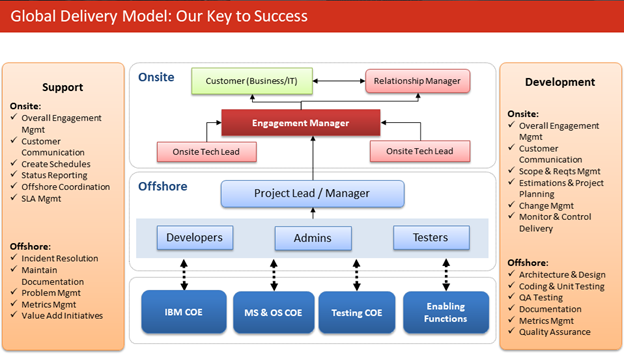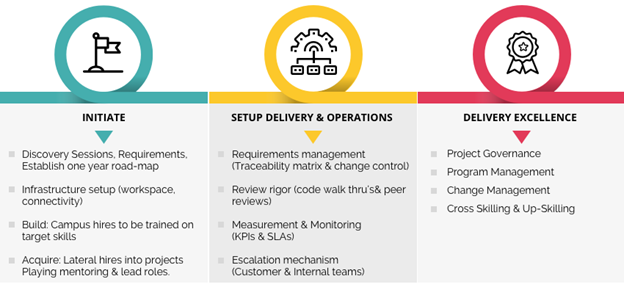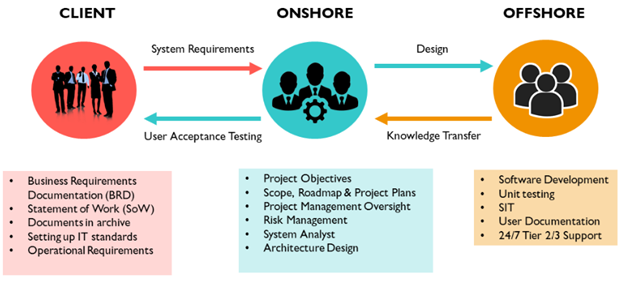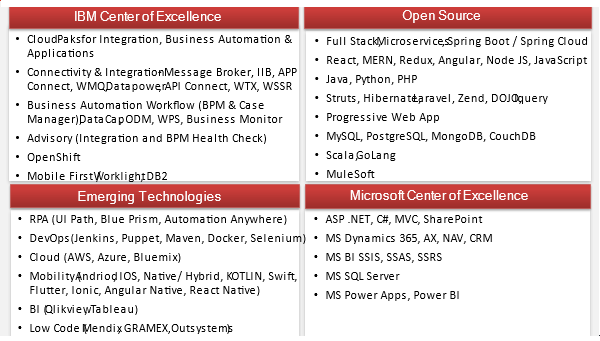Establish an Offshore Development Center (ODC) to help scale your IT quickly without
losing focus from your business objectives.
ODC will be a natural extension of client organization at vendor’s location and leverages
the technical and delivery expertise & gives access to large talent pool that’s associated
with the vendor.
Key Benefits of ODC
- Cost Savings: One of the main reasons companies opt for ODCs is the significant
cost savings.
Countries like India & Philippines offer skilled IT professionals at a fraction of
the cost compared to Western countries.
- Access to Talent: Setting up an ODC in countries known
for their tech expertise allows companies to tap into a large pool of
skilled professionals that they might not have access to in their home
country.
- Time Advantages: Companies can benefit from nearly
24/7 productivity by leveraging time zone differences. For example,
as the home country's workday ends, the ODC's workday can begin.
- Scalability: Companies can quickly scale up or down based
on their project requirements without the need to hire or lay off
in-house employees.
- Risk Mitigation: By diversifying their operations, companies
can reduce risks associated with depending on a single market
- Focused Expertise: Companies can have teams in the ODC that
are experts in specific domains or technologies, providing specialized
services efficiently.
- Knowledge Retention: Companies can retain the knowledge/know
how that comes out of an ODC
- SLA Driven Approach: Companies can set up ODC which are
driven by SLA based arrangement. This way the delivery & the outcome
ownership can be transferred to vendor & held them responsible.
- Peace of Mind: Companies can have peace of mind knowing
that the Offshore Development Team take full ownership of technology
direction & meet the client expectation.
ODC Engagement Model
ODC Setup – Stagewise Approach
Roles and responsibilities
Vendor Role
Vendor as a service provider groups up the development team of IT
specialists, locating them on one of their offices, matching it to
the customer’s needs, creating all the infrastructure for its scope
of work. Vendor’s ODC team will be dedicated to the scope of work for
the customer. The technology skills and volume of the outsourcing
services provided are decided by the customer, which can be development
of new solutions, expanding the functionality of the existing system,
migration to other platforms, testing, software support, and maintenance
etc. Some of the key roles within Vendor’s end are given below.
- Account Manager – Specializes in ensuring the
execution of all the tasks required by the customer. This person
makes sure that the customer is satisfied with vendor team’s work.
- Project Co-ordinator – Manage the ODC: priorities,
task completion planning, communication control and operative issues
solving.
- Architects, Tech Lead, Developers – Key team members
who executes the work assigned to them and make sure the deliverables
are matching to customer needs.
- Testers – Team to ensure the quality of work delivered.
Client Role
Customer comes with the need of the project/work which improves their current business
model and enhances their customer base. The customer is the one who dictates mostly the
timeframes estimated or sometimes requested. Some of the key roles from the client side
are given below.
- IT Manager – Head of IT Department. His main task is managing
all IT operations within the company. IT manager plans the development and evolution
strategy, compiles the budget etc. But all the expert functions are given to managers
of the respective department.
- Business Analysts - Creating a detailed business
analysis, outlining problems, opportunities, and solutions for a business.
Defining business requirements and reporting them back to stakeholders.
- IT Admin – Responsible for the network servers,
operating systems and security programs which would be used by the offshore
team. Responsible for setting the IT Standards & Operational Requirements.
Primary Services provided by the ODC
- Application Development
- Maintenance and Support
- Managed Services
- Testing Services
- Health Assessments
- Impact Analysis
- Consulting Services
ODC Standard Terms and Conditions
- Before the start of the ODC, vendor would get the MSA (Master Service
Agreement) signed between them and the customer. This agreement is signed agreeing
to a contract that will settle most details and expectations for both parties.
- Customer defines the SOW (Statement of Work) for each engagement
or project that vendor will be working as part of the Offshore Development Services.
This SOW will be signed by both parties before the start of work.
- Customer shall pay the fees as agreed in the SOW at the rates agreed
in MSA/SOW to be revised at least once in 12 months.
- Vendor shall send invoices to the customer once in every month.
- Payment shall be made in the agreed currency as per SOW.
- Vendors expect the payment to be made within 2 weeks from the date of invoice.
Choosing The Technology Stack
Customers must choose the technological stack for ODC based on their business needs & IT
roadmap. Some of the preferred tech stacks are listed below.
Indicative ODC commercials
Please get in touch with us to get the detailed rate card for setting up an Offshore
Development Center in India
Contact US:





